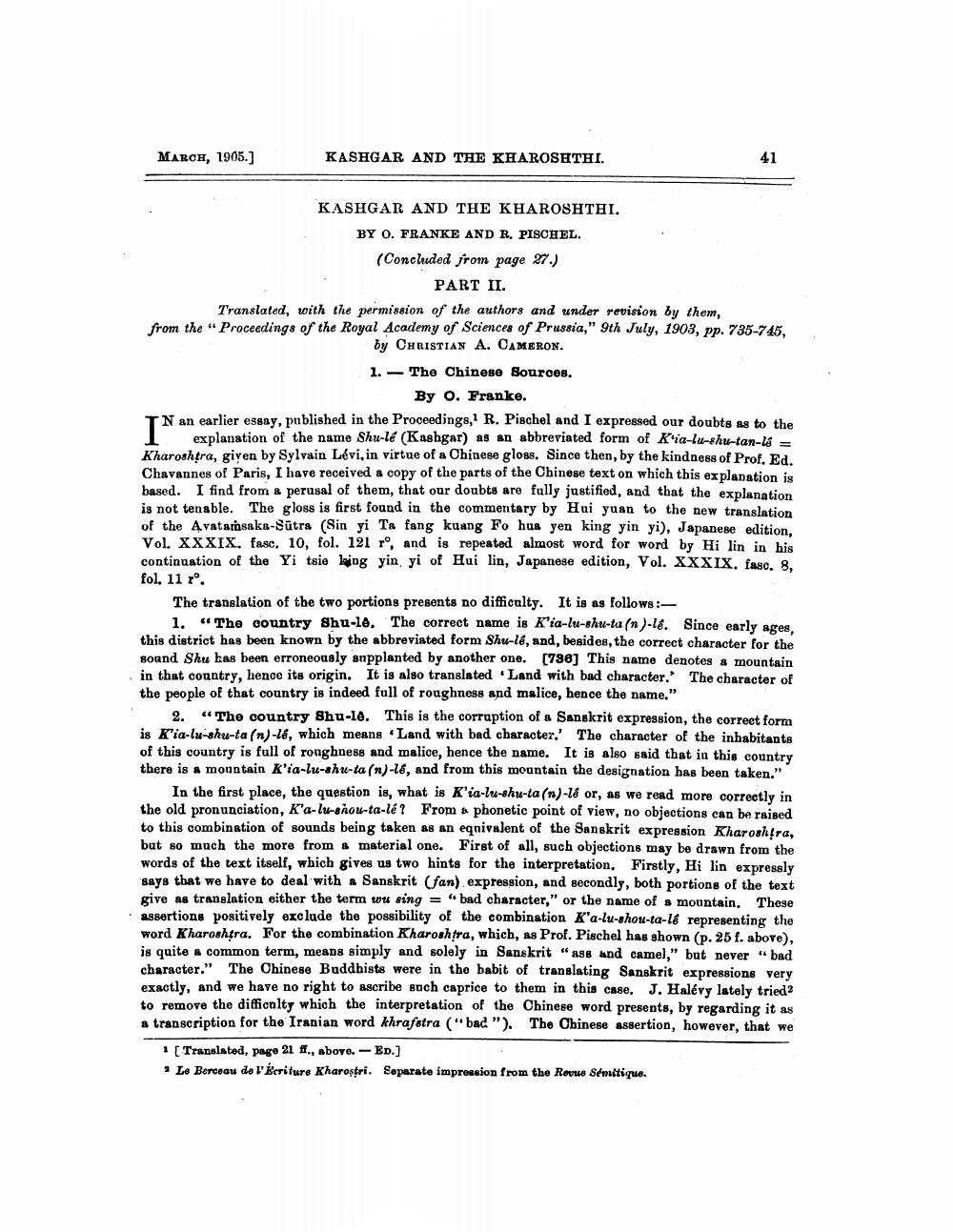________________
MARCH, 1905.]
KASHGAR AND THE KHAROSHTHI.
KASHGAR AND THE KHAROSHTHI. BY O. FRANKE AND R. PISCHEL. (Concluded from page 27.)
PART II.
Translated, with the permission of the authors and under revision by them, from the "Proceedings of the Royal Academy of Sciences of Prussia," 9th July, 1903, pp. 735-745,
by CHRISTIAN A. CAMERON.
1. The Chinese Bources.
By O. Franke.
41
IN an earlier our as
explanation of the name Shu-le (Kashgar) as an abbreviated form of Kia-lu-shu-tan-lé Kharoshtra, given by Sylvain Levi, in virtue of a Chinese gloss. Since then, by the kindness of Prof. Ed. Chavannes of Paris, I have received a copy of the parts of the Chinese text on which this explanation is based. I find from a perusal of them, that our doubts are fully justified, and that the explanation is not tenable. The gloss is first found in the commentary by Hui yuan to the new translation of the Avatamsaka-Sutra (Sin yi Ta fang kuang Fo hua yen king yin yi), Japanese edition, Vol. XXXIX. fasc. 10, fol. 121 ro, and is repeated almost word for word by Hi lin in his continuation of the Yi tsie king yin yi of Hui lin, Japanese edition, Vol. XXXIX. fasc. 8, fol. 11 r°.
The translation of the two portions presents no difficulty. It is as follows:
1. "The country Shu-le. The correct name is K'ia-lu-shu-ta (n)-lé. Since early ages, this district has been known by the abbreviated form Shu-lé, and, besides, the correct character for the sound Shu has been erroneously supplanted by another one. [788] This name denotes a mountain in that country, hence its origin. It is also translated Land with bad character. The character of the people of that country is indeed full of roughness and malice, hence the name."
2. "The country Shu-lê. This is the corruption of a Sanskrit expression, the correct form is K'ia-lu-shu-ta (n)-lé, which means Land with bad character.' The character of the inhabitants of this country is full of roughness and malice, hence the name. It is also said that in this country there is a mountain K'ia-lu-shu-ta (n)-le, and from this mountain the designation has been taken."
In the first place, the question is, what is K'ia-lu-shu-ta (n)-lé or, as we read more correctly in the old pronunciation, K'a-lu-shou-ta-lé? From a phonetic point of view, no objections can be raised to this combination of sounds being taken as an equivalent of the Sanskrit expression Kharoshtra, but so much the more from a material one. First of all, such objections may be drawn from the words of the text itself, which gives us two hints for the interpretation. Firstly, Hi lin expressly says that we have to deal with a Sanskrit (fan) expression, and secondly, both portions of the text give as translation either the term wu sing "bad character," or the name of a mountain. These assertions positively exclude the possibility of the combination K'a-lu-shou-ta-lé representing the word Kharoshtra. For the combination Kharoshtra, which, as Prof. Pischel has shown (p. 25 f. above), is quite a common term, means simply and solely in Sanskrit "ass and camel," but never "bad character." The Chinese Buddhists were in the babit of translating Sanskrit expressions very exactly, and we have no right to ascribe such caprice to them in this case. J. Halévy lately tried? to remove the difficulty which the interpretation of the Chinese word presents, by regarding it as a transcription for the Iranian word khrafstra ("bad"). The Chinese assertion, however, that we
[Translated, page 21 ff., above. - ED.]
2 Le Berceau de l'Écriture Kharoştri. Separate impression from the Revue Sémitique.




